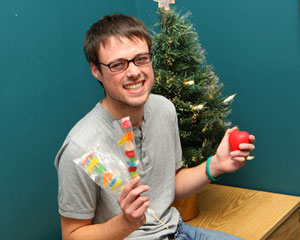 |
| Austin Oswald with the stress ball and candy that he included in his exam¬Ýsurvival kit. (Nick Pearce Photo) |
Call them Yankee swaps, Chinese auctions or White Elephant parties, but since the recession hit last fall, the low-cost holiday gift exchange is having a resurgence.
As Susan Tirone, professor in the School of Health and Human Performance, explains to her third-year Community Development class (HAHP 3000), the gift exchange is a prime example of alternative economics—a way of acquiring goods and services that doesn’t involve money.
There’s no better way to illustrate the old-fashioned seasonal tradition than to do it. Students were asked to bring in a gift that was either a re-gift, homemade or bought from a charity for less than $5.
The 60 students in Dr. Tirone’s class participated wholeheartedly; the table in the front of the classroom overflowed with holiday giftbags and festive wrapping paper. Some of the treasures included homemade jams, home canned peaches, a reusable mug, knitted hats and socks and a painting of a bumblebee.
“Instead of buying, it’s bartering systems and the whole idea of microcredit… (We need to) step outside of capitalism and look at other ways of acquiring the things you need,” says Dr. Tirone.
In sets of six, Dr. Tirone systematically called out student’s names. They then went to the front of the classroom and picked out a gift from their peers.
Several students brought in re-gifted items and many of these came with a story.
Once Shannon Hubbert’s dad in Alberta found out that Video Difference took Canadian Tire Money at par, he sent his daughter $50 in Canadian Tire Money for rentals. A $5 portion of Ms. Hubbert’s movie rental fund was wrapped up and regifted.
Third-year health promotion student, Elizabeth Camus wanted to bring in something that represented the environment and sustainability so her gift was fresh roses. In exchange, she received some delicious homemade brownies.
Jenna Fernley carefully chose a gift that wasn’t going to be for her or anyone she knew for that matter. In exchange for a jar of homemade curried pickles she brought in, she picked out a scarf from the gift table which she plans to give to a homeless person.
Austin Oswald created an exam survival kit, which included a homemade stress ball, chocolate, candies and a good luck note. In exchange, he received a homemade face cloth and a bar of goat’s milk soap that he plans to put in his mom’s stocking.
“I loved it,” he enthuses. “I thought it was an interesting approach to the holiday season and it brought the whole class together.”
Cheryl Jeffers Johnson crocheted the facecloth Ms. Oswalk received and, in return,¬Ý she snagged a toque for her son.
“I thought it was a wonderful way to use everyone’s resources to come up with something to sell or give and bypass the monetary system” says Ms. Johnson.
explores ways of developing communities in the domains of cultural, social, and health. This was the first year Dr. Tirone coordinated the gift exchange. She felt that the swap was successful and next year plans to involve more local charities.
